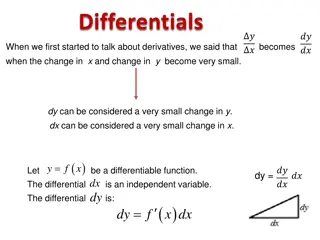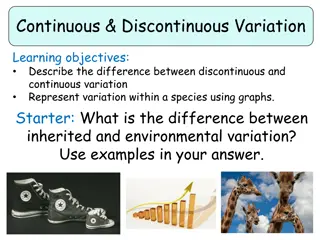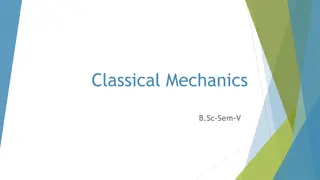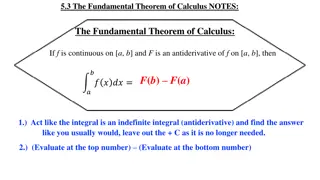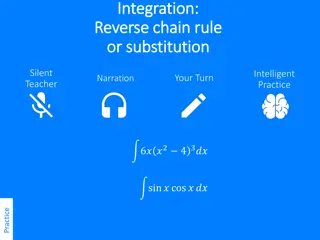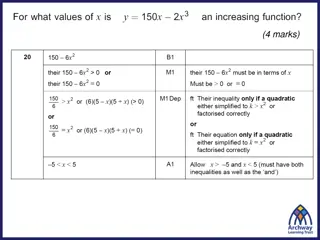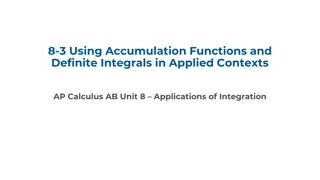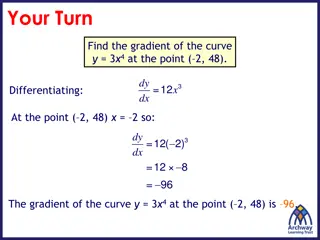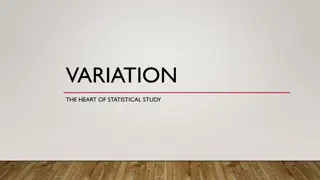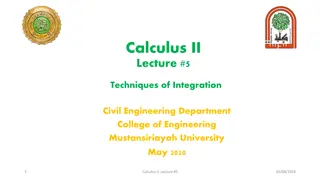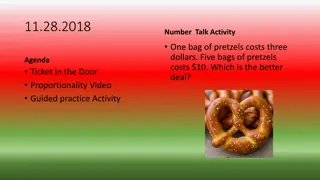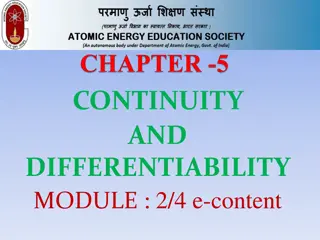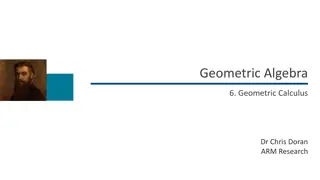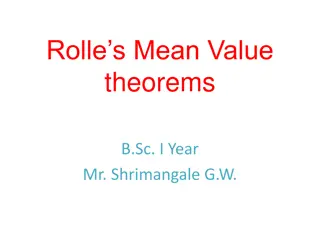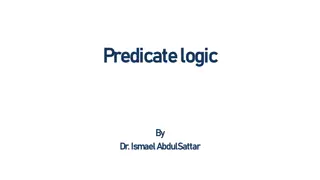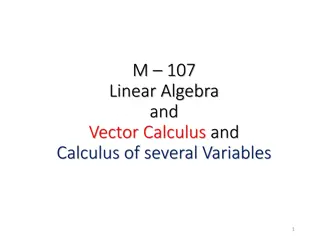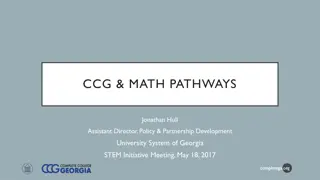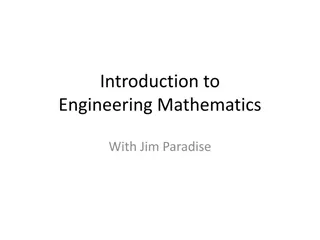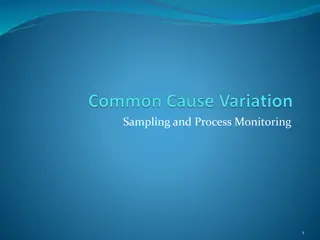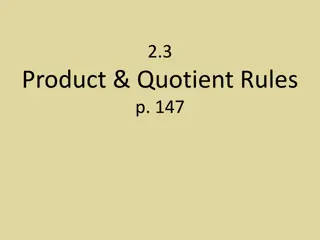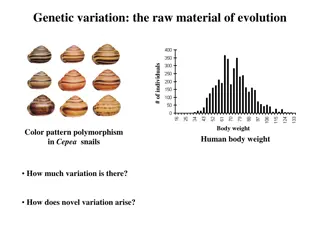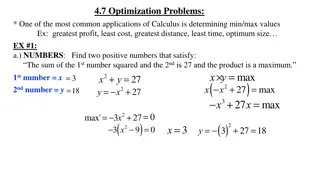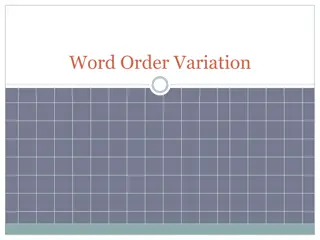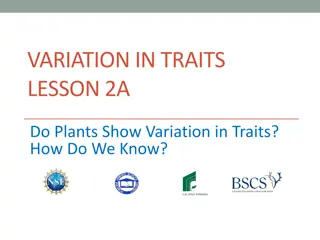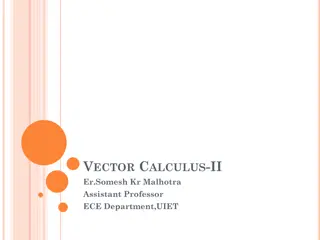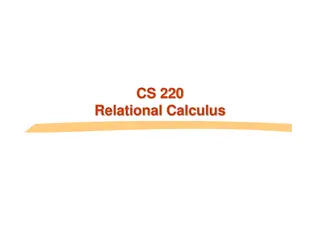Mathematics Course Selection Guide for Fall Semester
Academic advisors Olivia Biehle, Nathaniel Sulapas, and Jennifer McHam at the University of Texas provide guidance on selecting mathematics courses for the fall semester. The guide includes information on course sequences, considerations based on UTMA scores, AP credit recommendations, dual credit o
3 views • 20 slides
Understanding Dental Calculus Formation and Classification
Dental calculus, also known as tartar, is a mineralized bacterial plaque that forms on natural teeth and dental prostheses. It can be classified as supragingival or subgingival based on its relation to the gingival margin. This hard deposit is formed through the mineralization of dental plaque and c
5 views • 36 slides
AQA Level 2 Certificate in Further Maths
The AQA Level 2 Certificate in Further Maths is designed for high-achieving students to develop advanced skills in algebra, geometry, calculus, matrices, trigonometry, functions, and graphs. The course covers topics like number fractions, decimals, algebraic fractions, coordinate geometry, calculus,
7 views • 9 slides
Understanding Integral Calculus: Two Major Approaches & Antiderivatives
In this chapter, we delve into the fundamental concepts of integral calculus, focusing on two major approaches to mathematically generate integrals and assigning physical meanings to them. We explore antiderivatives, differentiation, integration, and the process of taking integration as the inverse
2 views • 59 slides
Understanding Related Rates and Differentials in Calculus
Derivatives involve very small changes in variables, leading to differentials. Related rates in calculus help us find how variables change in relation to each other. Learn how to solve related rates problems step by step with examples involving volumes, radii, and rates of change.
0 views • 11 slides
Understanding Continuous and Discontinuous Variation in Species
Explore the concepts of continuous and discontinuous variation within species, distinguishing between inherited and environmental factors. Engage in practical activities to represent variation graphically and categorize characteristics based on their variability. Promote interactive learning through
0 views • 15 slides
Understanding Classical Mechanics: Variational Principle and Applications
Classical Mechanics explores the Variational Principle in the calculus of variations, offering a method to determine maximum values of quantities dependent on functions. This principle, rooted in the wave function, aids in finding parameter values such as expectation values independently of the coor
0 views • 16 slides
Understanding Somaclonal Variation in Plants
Somaclonal variation refers to genetic variations in plants produced through tissue culture, leading to changes in chromosome structure, growth rate, and fertility. This variation can be caused by physiological, biochemical, and genetic factors, and is detectable through morphological and cytologica
0 views • 21 slides
Understanding the Fundamental Theorem of Calculus
The Fundamental Theorem of Calculus states that if a function is continuous on an interval and has an antiderivative on that interval, then the integral of the function over the interval is equal to the difference of the antiderivative evaluated at the endpoints. This concept is further explored thr
0 views • 14 slides
Integrating Reverse Chain Rule and Substitution in Calculus
Explore the concepts of reverse chain rule and substitution in integration through worked examples and practice questions involving trigonometric functions. Enhance your skills with interactive narration and practical exercises. Dive into the world of calculus with a silent teacher guiding you throu
0 views • 5 slides
Understanding Points of Inflection in Calculus
Points of inflection in calculus refer to points where the curve changes from convex to concave or vice versa. These points are identified by observing changes in the curve's concavity, and they are not always stationary points. A stationary point can be a point of inflection, but not all points of
0 views • 14 slides
Understanding Accumulation Problems and Definite Integrals in Applied Calculus
Explore the interpretation of definite integrals in accumulation problems, where rates of change are accumulated over time. Learn how to solve accumulation problems using definite integrals and avoid common mistakes by understanding when to use initial conditions. Discover the relation between deriv
0 views • 9 slides
Understanding Rates of Change and Calculus Concepts
Exploring the concept of rates of change through examples like finding the equation of a line passing through given points and understanding differentiation to calculate gradients and speeds. The relationship between gradients, curves, and tangents is highlighted to illustrate how calculus helps in
1 views • 21 slides
Calculus Examples and Practice
Explore various calculus problems involving finding gradients, equations of tangents and normals, and analyzing curves. Practice determining gradients at specific points, solving for coordinates, and differentiating equations to find tangent and normal lines. Understand the relationship between grad
1 views • 11 slides
Understanding Variation in Statistical Studies
Variability is key in statistical studies, shaping the essence of statistical analysis. Students often struggle to grasp the concept of variability, despite being taught statistical methods. The term "variation" takes on different meanings in various statistical contexts, presenting challenges in co
2 views • 54 slides
Overview of Vector Calculus for ECE 3317 Course
This overview provides a brief explanation of vector calculus concepts essential for the ECE 3317 course on Applied Electromagnetic Waves. It covers del operator, gradient, divergence, curl, vector Laplacian, vector identities, and their applications in electromagnetic field theory.
0 views • 24 slides
Techniques of Integration in Calculus II
Explore various techniques of integration in Calculus II such as basic integration formulas, simplifying substitutions, completing the square, expanding powers with trigonometric identities, and eliminating square roots. Examples and solutions are provided to help understand these integration method
0 views • 8 slides
Understanding Formal Semantics of Programming Languages: From Lambda Calculus to Separation Logic
Explore the foundational concepts of formal semantics in programming languages, covering Lambda Calculus, Untyped and Simply-typed languages, Imperative languages, Operational and Hoare logics, as well as Separation logic. Delve into syntax, reduction rules, typing rules, and operational semantics i
7 views • 14 slides
Understanding Direct Variation in Math
Explore the concept of direct variation in math through an analysis of proportional relationships, constants of proportionality, and graph representation. Practice identifying direct variation and determining the constant of proportionality to interpret the data effectively.
0 views • 20 slides
Understanding Continuity and Differentiability in Calculus
This module covers the concepts of continuity and differentiability in calculus, including the definition of derivatives, differentiability criteria, the Chain Rule, and derivatives of implicit functions. The content discusses the relationship between continuity and differentiability, previous knowl
0 views • 12 slides
Understanding Geometric Algebra and Calculus: A Deep Dive into Vector Derivatives and Maxwell Equations
Explore the world of geometric algebra and calculus through topics such as vector derivatives, Cauchy-Riemann equations, Maxwell equations, and spacetime physics. Unify diverse mathematical concepts to gain insights into analytic functions, differential operators, and directed integration.
0 views • 20 slides
Understanding Rolle's Mean Value Theorem in Calculus
Rolle's Mean Value Theorem states that if a function is continuous in a closed interval, differentiable in the open interval, and the function values at the endpoints of the interval are equal, then there exists at least one point where the derivative of the function is zero. This theorem is verifie
0 views • 11 slides
Understanding Predicate Calculus: Symbols, Terms, and Variables
Predicate calculus extends propositional calculus by introducing symbols like truth values, constants, variables, and functions. It allows for precise manipulation of components within assertions, enabling the creation of general statements about classes of entities. Learn how predicates define rela
1 views • 14 slides
Linear Algebra and Vector Calculus Course Details
This course covers topics in linear algebra and vector calculus, including systems of linear equations, matrices, determinants, vector operations, functions of several variables, differentiation, and optimization. Textbooks by H. Anton and Swokowski are recommended, along with additional lecture not
0 views • 13 slides
Enhancing Math Pathways for College Completion
Addressing the significance of mathematics in degree completion, the Complete College Georgia initiative focuses on aligning gateway math courses with academic programs. Recommendations include offering Quantitative Reasoning and Introduction to Mathematical Modeling for non-STEM majors. The Algebra
0 views • 20 slides
Understanding Engineering Mathematics Fundamentals
Explore the core concepts of Algebra, Geometry, Trigonometry, and Calculus in engineering mathematics. Discover the historical roots, essential properties, and real-world applications of these mathematical principles, along with the significance of calculus for engineering students. Gain insights in
0 views • 41 slides
Understanding Common Cause Variation in Sampling and Process Monitoring
Common cause variation is inherent to a process and represents background noise that can obscure signals of special cause variation. Sampling plans and rational subgrouping help estimate and manage common cause variation in quantitative data. Estimating common cause involves assessing variation with
2 views • 11 slides
Calculus Derivatives and Rules
Explore the fundamental concepts of calculus involving product and quotient rules, derivatives of trigonometric functions, higher-order derivatives, and applications in position, velocity, and acceleration. The homework assignments provided further reinforce learning and mastery of these topics.
0 views • 8 slides
Understanding Genetic Variation and Its Role in Evolution
Genetic variation is crucial for evolution, providing the raw material for adaptation and species diversity. Phenotypic variation can arise from differences in genotype, environment, or their interaction. Studying genetic variation through statistical analysis and at the molecular level helps us unr
0 views • 47 slides
Isaac Newton: Contributions to Mathematics and Physics
Isaac Newton, a renowned physicist and mathematician from England, was the greatest scientist of his era. Despite being described as 'idle' and 'inattentive' in school, he formulated the Three Laws of Motion and the law of Universal Gravitation. Newton's mathematical contributions include studying p
0 views • 16 slides
Understanding Evolution: Natural Selection and Genetic Variation
Change in genetic makeup over time is evolution. Natural selection, driven by competition for resources, leads to differential survival and reproductive success. Genetic variation, mutation, and adaptation play roles in this process. Environmental changes influence evolutionary rate and direction. H
0 views • 20 slides
Applications of Calculus in Optimization Problems
Calculus plays a crucial role in solving optimization problems to find maximum or minimum values in various real-life scenarios. This content provides examples of optimizing for maximum profit, area, distance, and volume using calculus concepts. From finding optimal dimensions for fencing to maximiz
0 views • 10 slides
Understanding Calculus: From MVT to FTC with Lin McMullin
Join Lin McMullin in exploring the transition from the Mean Value Theorem (MVT) to the Fundamental Theorem of Calculus (FTC). Discover the significance of MVT, Fermat's Theorem, Rolle's Theorem, and the Mean Value Theorem, all crucial concepts in calculus. Engage in graphical explorations, proving m
0 views • 45 slides
Understanding the Fundamental Theorem of Calculus
Explore the connection between differential calculus and the definite integral through the fundamental theorem of calculus, which allows for the evaluation of complex summations. Discover the properties of definite integrals and how to apply the theorem to find areas under curves. Practice evaluatin
0 views • 15 slides
Understanding Word Order Variation in Language
Explore the concept of word order variation in language, focusing on themes and rhemes. Learn how the word order can be varied and the reasons behind such variations. Discover methods to achieve variation, including thematization and it-cleft structures. Delve into examples illustrating themed reord
0 views • 7 slides
Understanding Latency Variation in Modern DRAM Chips
This research delves into the complexities of latency variation in modern DRAM chips, highlighting factors such as imperfect manufacturing processes and high standard latencies chosen to boost yield. The study aims to characterize latency variation, optimize DRAM performance, and develop mechanisms
0 views • 37 slides
Challenges of Syntactic Variation in Biblical Hebrew
Linguistic variation in Biblical Hebrew has sparked a heated debate since 2000, challenging traditional dating methods and assumptions. The Structure Debate delves into syntactic variation and the use of the participle, while considering the differing language in Early Biblical Hebrew (EBH) and Late
0 views • 21 slides
Exploring Plant Traits: Understanding Variation in Characteristics
Delve into the world of plant traits and variation in this interactive lesson. Discover how plants exhibit different traits and explore the concept of variation within species. Engage in investigations, measurements, and discussions to deepen your understanding of plant characteristics. Uncover the
0 views • 12 slides
Understanding Vector Calculus II Concepts with Examples by Prof. Somesh Kr. Malhotra
Explore advanced topics in vector calculus including gradient, divergence, curl, and theorems like the Divergence Theorem and Stokes' Theorem. Follow along with examples presented in Cartesian, spherical, and cylindrical coordinates to deepen your understanding of vector calculus concepts.
0 views • 29 slides
Introduction to Relational Calculus and Algebra in Database Management
Explore the fundamental concepts of relational calculus and algebra in the domain of database management. Understand the differences between declarative and imperative query languages and learn to retrieve information using practical examples and theoretical frameworks such as tuple relational calcu
0 views • 23 slides




